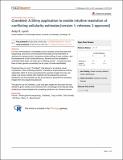Crambled : a Shiny application to enable intuitive resolution of conflicting cellularity estimates
Abstract
It is now commonplace to investigate tumour samples using whole-genome sequencing, and some commonly performed tasks are the estimation of cellularity (or sample purity), the genome-wide profiling of copy numbers, and the assessment of sub-clonal behaviours. Several tools are available to undertake these tasks, but often give conflicting results - not least because there is often genuine uncertainty due to a lack of model identifiability. Presented here is a tool, "Crambled", that allows for an intuitive visual comparison of the conflicting solutions. Crambled is implemented as a Shiny application within R, and is accompanied by example images from two use cases (one tumour sample with matched normal sequencing, and one standalone cell line example) as well as functions to generate the necessary images from any sequencing data set. Through the use of Crambled, a user may gain insight into why each tool has offered its given solution and combined with a knowledge of the disease being studied can choose between the competing solutions in an informed manner.
Citation
Lynch , A 2015 , ' Crambled : a Shiny application to enable intuitive resolution of conflicting cellularity estimates ' , F1000Research , vol. 4 , 1407 . https://doi.org/10.12688/f1000research.7453.1
Publication
F1000Research
Status
Peer reviewed
ISSN
2046-1402Type
Journal article
Rights
Copyright © 2015 Lynch AG. This is an open access article distributed under the terms of the Creative Commons Attribution Licence, which permits unrestricted use, distribution, and reproduction in any medium, provided the original work is properly cited.
Items in the St Andrews Research Repository are protected by copyright, with all rights reserved, unless otherwise indicated.

